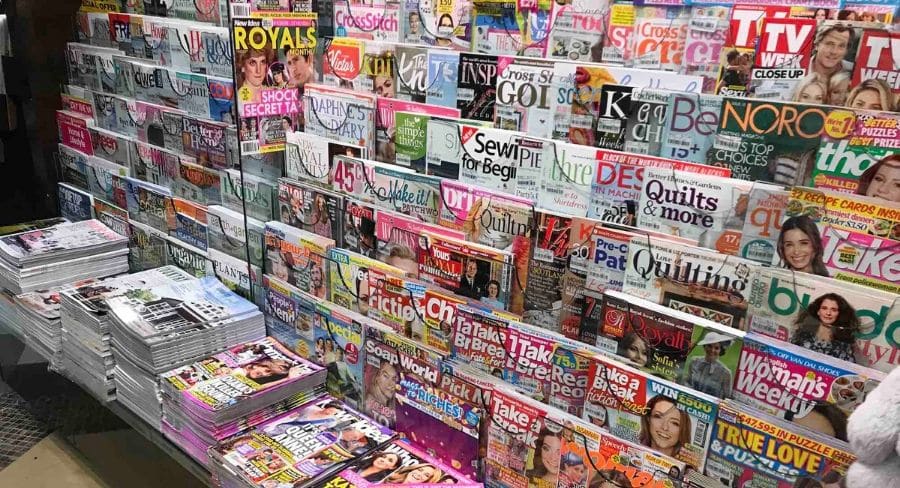“Australians love magazines and they want Australian stories represented on their pages.” That is the message from Melbourne newsagent Mark Fletcher when Mediaweek asked him about the sector in Australia. And after Bauer Media closed its New Zealand operation, which Fletcher said stunned not only him, but people he knew in Bauer Media Australia, we asked about Bauer’s future in Australia.
“I don’t think that Bauer is looking to exit Australia, but I say that without any special knowledge.”
If anybody has a good understanding of magazine economics in Australia it should be Fletcher. He publishes a daily newsagency blog, owns three retail newsagencies (two in shopping centres, one on the high street), owns newsXpress, a franchised group with 225 stores, in addition to operating Tower Systems which supplies POS software to 1,700 newsagencies. “I have fingers in a few pies!” Fletcher estimates there are roughly 3,000 retail newsagents in Australia.
Magazines remain important for newsagencies, but not as much as they once were. “Magazine sales have been declining over the longer term,” said Fletcher. “They remain an important part of the business, but newsagents now have other traffic drivers in businesses now.”
When asked if keeping people at home in lockdown may be fast tracking where the sector was heading, Fletcher replied: “Within newsagency channels, a lot of the discussion has been about decisions like some publishers pulling back were possibly on the radar. The coronavirus situation is bringing those things forward. We are seeing similar things in newspapers with regional and suburban titles impacted.
“When advertising revenue dries up the directors [of publishers] have to make a decision at what point do they declare the business non-viable. Any assessment of the current situation indicates we are probably in for 6-12 months of significant economic pain. Are publishers prepared to wait that period of time to see if there is something on the other side?

“My take is that the Bauer family are very pragmatic which is why you haven’t seen the Pacific Magazines transaction completed at this stage.”
Fletcher said he wouldn’t be surprised to see Bauer eventually make moves about rationalising its range in Australia.
Newsagents have been disappointed in the past with the way some publishers engaged with the distribution channel.
“Early on Bauer was engaged and active with newsagents. That faded, but now we are in a situation where they are engaging much better with newsagents in the past 12 months.”
Fletcher thinks newsagents have been doing better with magazine titles in the past 12 months because petrol and convenience stores aren’t as strong as they once were. “We remain a destination for many people because of the depth of range we still have. A typical newsagent still might have 700-800 different titles. A shopper looking for diversity is catered for. At present crossword titles, craft and scrapbooking are all doing really well and growing. Your average newsagent is looking at magazine sales being up probably 10 or 11 per cent year-on-year. That has remained the case for much April and May – if our stores remain open.”
One challenge for the industry could be distribution. Ovato, the business formerly known as PMP and its distribution arm Gordon and Gotch, is facing big challenges with shares trading under two cents as it grapples with reduced printing demand which is its main business.
Fletcher wondered if it is an area that News Corp might move into. “They have the infrastructure to get product out there. Could that be an option for them? The Ovato situation is a hot topic for newsagents because at different points in the cycle Ovato owes newsagents money for returned product.”

Fletcher speculated if there was a withdrawal of the major distributor it could take weeks for a replacement to be ready. “Would that be something to push some magazines over the edge? Some newsagents have also said they would not open their doors if that happened because some rely so much on magazine revenue.”
Overall regional and rural newsagents are in good shape, said Fletcher. So good that he doesn’t expect many will meet the criteria of seeing revenue drop 30% or more to qualify for Job Keeper program.
“High street metro newsagencies aren’t doing too badly either. However it is in shopping centres where things are different. We are seeing declines of 60-80% year-on-year. One of the fallouts will probably be less newsagencies in shopping centres.”
As to reasons why the hunger for magazines has declined, there are several, said Fletcher. “As soon a publishers started putting their top performing titles in supermarkets at checkouts it cut down the browsing of magazine aisles. Browsing was key to people picking up multiple titles. The impulse purchase of magazines is really important.
“The long tail that newsagents provide – a broad range of titles in smaller numbers – is really valuable to our channel. The speciality customer is glued to the business and returns regularly to find their niche titles.”
